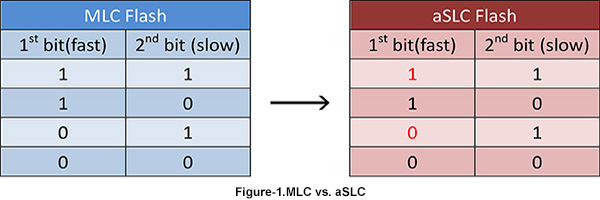| ||||
 |
| APRO Releases the Latest PHANES-K Series mSATA (MO-300A) SSD in SLC, MLC and aSLC solutions |
|
APRO's PHANES-K Series SLC, MLC & aSLC mSATA (MO-300A) SSD use SATA-III controller and Toshiba Flash IC, providing SLC, MLC & aSLC solutions to satisfy various mission-critical or price-sensitive applications. The firmware of PHANES-K Series SLC, MLC & aSLC mSATA SSD is designed with below technologies to ensure the reliability and increase the lifespan for NAND Flash IC on heavy workload applications. LDPC ECC: The LDPC (low-density parity check error correction code) technology, comparing to the existing error correction code (ECC), has more excellent error correction capability for longer code lengths, and it can greatly improve the life cycle of flash memory which means more errors can be corrected on each page to maintain a longer lifespan of the flash memory. Power Loss Data Protection: In order to ensure that the last read/write command can be completed, the firmware-based power loss data protection will immediately stop reading or writing command when it senses the unstable power or insufficient wattage. Therefore, the data can be safely and completely saved in the mSATA SSD. Once the power is restored, the system will move on with the process. Static & Dynamic Wear Leveling: The advanced wear leveling algorithm is used to effectively spread the usage across the whole medium of flash memory. Besides, the static & dynamic wear leveling also improves the lifespan of NAND Flash memory. Garbage collection & TRIM: PHANES-K Series SLC, MLC & aSLC mSATA SSD use garbage collection & TRIM to reduce the amount of garbage in order to decrease the unnecessary wear of the Flash IC. S.M.A.R.T.: The user can check the health condition of the mSATA SSD at any time by implementing S.M.A.R.T. function. It can not only predict the lifespan of mSATA SSD, but collect the data to know the usage of mSATA SSD, letting users replace with the new product at the proper time. Or, you can also provide the relevant data to APRO engineers to do the technical analysis, and APRO will offer the effective solution. aSLC Technology: The aSLC can be considered as an extended version of the MLC. While MLC contains both fast and slow pages, aSLC only utilizes fast pages for programming. The concept of aSLC is demonstrated in the Figure 1 below. The first and second bits of a memory cell represent a fast and slow page respectively, as shown in the left table. Since only fast pages are programmed when applying aSLC Technology, the bits highlighted in red are used, as shown in the right table. As a result, aSLC provides better performance at the same capacity and endurance than MLC does. Moreover, the aSLC performs similarly to SLC based on mSATA SSD, yet more cost effective. 
In addition, APRO PHANES-K Series SLC, MLC & aSLC mSATA SSD also conform to the SATA 3.2 (6.0Gb/sec) specification with low power consumption and provide compatibility with 3.0Gb/s and 1.5Gb/s interface as well. Moreover, to ensure the reliability of quality and ability in harsh environmental temperatures, APRO chooses strictly the high-end components and conform to the standard of the industrial system. APRO PHANES-K Series SLC, MLC & aSLC mSATA SSD are designed to be used not only in the standard temperature 0°C ~ +70°C but also in wide temperature -40°C ~ +85°C. Furthermore, APRO applies the conformal coating to the PCBA of mSATA SSD to combine the advantages of moisture, dirt, and dust prevention and chemical pollution. The conformal coating can also prevent the corrosion from soldering, becoming an isolation and eliminating the electromagnetic interference. The capacities are available as follows:
About mSATA SSD
mSATA SSD is solid-state drives (SSDs) that conform to the mSATA interface specification developed by the Serial ATA (SATA) International Organization, as well as maintain the form factor compliant with JEDEC MO-300A specifications. mSATA SSD has the size similar to a business card. It is designed for use in portable, power-constrained devices such as laptops, tablets, and notebooks. Advantages of mSATA SSDs include the small form factor, low power consumption, shock/vibration resistance and fast boot/shutdown capabilities. |
 |
 |
 |
 |
 |
 |
 |
||||||
|
| ||||||||

